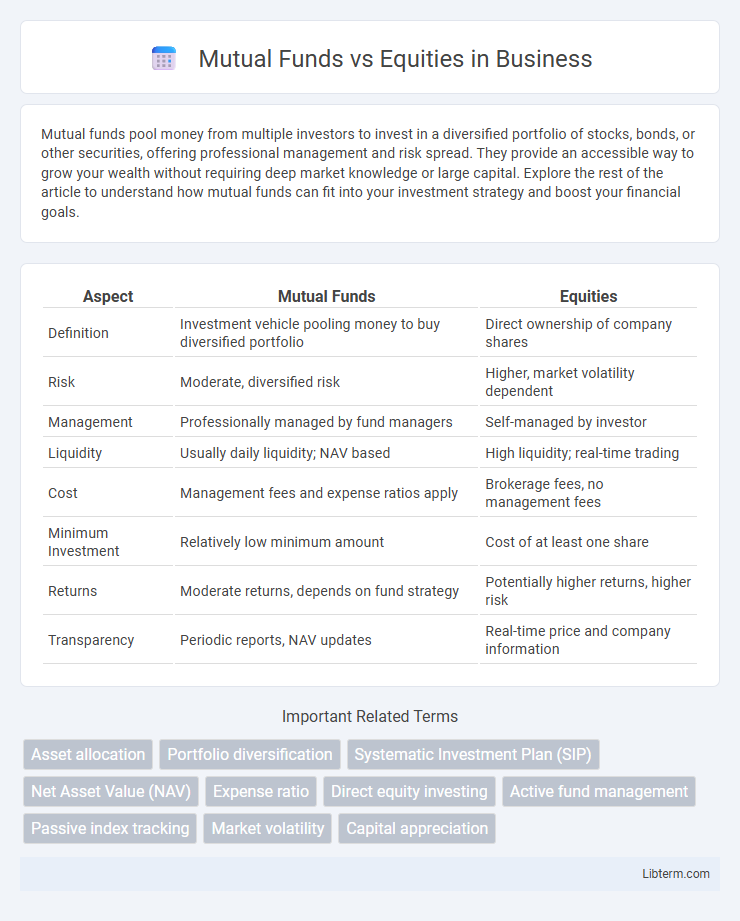Mutual funds pool money from multiple investors to invest in a diversified portfolio of stocks, bonds, or other securities, offering professional management and risk spread. They provide an accessible way to grow your wealth without requiring deep market knowledge or large capital. Explore the rest of the article to understand how mutual funds can fit into your investment strategy and boost your financial goals.
Table of Comparison
| Aspect | Mutual Funds | Equities |
|---|---|---|
| Definition | Investment vehicle pooling money to buy diversified portfolio | Direct ownership of company shares |
| Risk | Moderate, diversified risk | Higher, market volatility dependent |
| Management | Professionally managed by fund managers | Self-managed by investor |
| Liquidity | Usually daily liquidity; NAV based | High liquidity; real-time trading |
| Cost | Management fees and expense ratios apply | Brokerage fees, no management fees |
| Minimum Investment | Relatively low minimum amount | Cost of at least one share |
| Returns | Moderate returns, depends on fund strategy | Potentially higher returns, higher risk |
| Transparency | Periodic reports, NAV updates | Real-time price and company information |
Understanding Mutual Funds and Equities
Mutual funds pool money from multiple investors to invest in a diversified portfolio of stocks, bonds, or other securities, managed by professional fund managers, offering diversification and reduced risk. Equities represent ownership shares in a company, providing investors with voting rights and potential dividends, but carrying higher volatility and risk compared to mutual funds. Understanding the distinct structures, risk profiles, and management styles of mutual funds and equities is essential for making informed investment decisions aligned with financial goals.
Key Differences Between Mutual Funds and Equities
Mutual funds pool money from multiple investors to invest in a diversified portfolio managed by professionals, offering reduced risk and ease of access, while equities represent direct ownership in individual companies, subject to higher volatility and potential returns. Mutual funds provide diversification, liquidity, and professional management, contrasted with equities' direct exposure to market fluctuations and company-specific risks. Cost structures also differ, with mutual funds charging management fees and expense ratios, whereas equities incur brokerage fees and no ongoing management charges.
Risk Factors in Mutual Funds vs Equities
Mutual funds spread risk by investing in a diversified portfolio of equities, bonds, or other securities, reducing exposure to any single asset's volatility, whereas equities carry higher risk due to their susceptibility to market fluctuations and company-specific events. Mutual funds are managed by professional fund managers who actively monitor and adjust holdings to mitigate risks, offering a buffer for less experienced investors. Equities offer greater potential returns but come with amplified risk factors including market volatility, economic downturns, and sector-specific challenges.
Returns: Comparing Mutual Funds and Equities
Mutual funds offer diversified exposure to equities, often resulting in steadier but potentially lower returns compared to direct equity investments. Equities can yield higher returns driven by market volatility and stock-specific growth, yet they carry increased risk and require active management. Historical data shows long-term equity returns averaging around 10-12% annually, while mutual funds typically deliver 7-9%, reflecting managed risk and diversification benefits.
Investment Strategies: Mutual Funds vs Equities
Mutual funds provide diversified investment portfolios managed by professionals, reducing individual risk and requiring less active involvement from investors. Equities offer direct ownership in companies, allowing investors to capitalize on stock price appreciation but exposing them to higher volatility and the need for active monitoring and research. Strategic allocation between mutual funds and equities depends on an investor's risk tolerance, time horizon, and desired level of involvement in portfolio management.
Liquidity Considerations in Mutual Funds and Equities
Mutual funds offer higher liquidity with the ability to redeem units at the end of each trading day at the net asset value (NAV), providing easier access to cash compared to equities. Equities trade on stock exchanges, offering intraday liquidity and the potential for immediate sale, but prices can experience volatility affecting realizable value. Investors must weigh mutual funds' delayed redemption process against equities' market fluctuation risks when considering liquidity needs.
Costs and Fees: Mutual Funds vs Equities
Mutual funds typically incur management fees and expense ratios, which can range from 0.5% to 2% annually, impacting overall returns. Equities, or individual stocks, generally involve lower direct costs, limited to brokerage commissions and transaction fees, which have decreased with the rise of commission-free trading platforms. Investors must weigh these cost structures against their investment goals and trading frequency to optimize net gains.
Tax Implications for Mutual Funds and Equities
Mutual funds distribute capital gains and dividends to investors, which are taxed at different rates depending on holding period and type of income, often leading to annual tax liabilities even if funds are not sold. Equities are taxed primarily through capital gains only upon sale, with long-term gains benefiting from lower tax rates, allowing for more tax-efficient growth if shares are held over a year. Understanding the distinct tax treatments is essential for optimizing investment returns and effective tax planning in both mutual funds and equities.
Suitability: Who Should Invest in Mutual Funds or Equities?
Mutual funds are suitable for investors seeking diversified portfolios managed by professionals, ideal for beginners or those with limited time to research individual stocks. Equities appeal to experienced investors comfortable with higher risk and actively managing their investments for potentially higher returns. Risk tolerance, investment horizon, and financial goals are key factors in deciding between mutual funds and equities.
Final Verdict: Choosing Between Mutual Funds and Equities
Mutual funds offer diversified portfolios managed by professionals, reducing individual risk compared to direct equities investment, which demands active decision-making and thorough market knowledge. Investors prioritizing convenience, risk mitigation, and steady returns often prefer mutual funds, while those seeking higher potential gains with greater control may opt for equities. Assessing financial goals, risk tolerance, and investment horizon is crucial in deciding between mutual funds and equities for optimal portfolio alignment.
Mutual Funds Infographic

 libterm.com
libterm.com